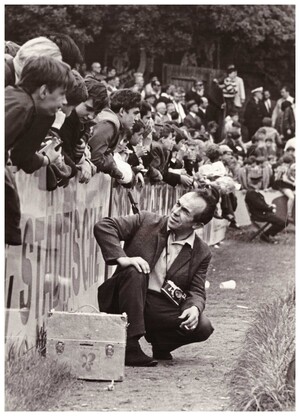Picturing Migrants Lives'
Jovan Ritopečki’s photographic documentation of Yugoslav labour migration in Austria (1970–89)
The research project focuses on photographic representations of Yugoslav labour migrants in Austria of the 1970s and 80s. In this effort, it closes an evident research gap in the Austrian context, since the visual worlds brought forth by this history have not been scientifically examined to date, nor have the photographic sources relating to the topic been systematically processed.
The photographic legacy of Yugoslav photographer Jovan Ritopečki (1923–1989) forms the departure point of this study. In 1966, Ritopečki migrated from Belgrade to Vienna where he established himself as a freelance press photographer in the early 1970s. This first-time critical analysis of his work will investigate how Yugoslav migration was visualised in his photographs and shaped through contemporary societal contexts as well as the ways in which the pictures were used.
Ritopečki's photographic legacy represents an exceptionally rich resource: like no other photographer in Austria, he documented the lives of Yugoslav migrants over a period of twenty years. A further hypothesis in this connection assumes that due to his social positioning, his comprehensive photographic production, the purpose of his work and the manner in which the images were used, Ritopečki's photographs will provide insights into dimensions of the social and everyday life of Yugoslav labour migrants scarcely taken note of to date, and thus enable a shift in public and scientific perspectives on the history of Yugoslav migration.
The study will apply the method of serial-iconographic photography analysis. By investigating central themes and motifs in a historical cross-section, it aims to determine the dominant and historical changes and shifts in Ritopečki's photographic work as well as to trace their interaction with societal developments. It will be interesting to see in how far Ritopečki's photographs can be read as a socially critical reflection of the life circumstances of Yugoslav migrants in Austria. Further levels of analysis concern gender-specific aspects of representation, the transcultural and translocal dimension of the photographer’s production, as well as questions about the creation of identity and community in his pictures in connection with the self-localisation and self-representation of Yugoslav migrants in Austria.
This case study intends to make new visual sources accessible to researchers and the public. The digitisation and public presentation of a representative stock of images from Ritopečki’s photographic legacy in the virtual Visual Archive Southeastern Europe (VASE) forms an integral part of the project. The digital collection will be created in cooperation with the Centre for Information Modelling – Austrian Centre for Digital Humanities (ZIM) at the University of Graz.
Website of project partners:
Visual Archive Southeastern Europe
Centre for Information at the University of Graz
Contact
Project duration
January 2020 - July 2025
Project Partner
Institute Centre for Information Modelling (ZIM), University of Graz
Dr. Martina Scholger
Suzana Sagadin, BA
Funding
FWF Austrian Science Fund: T 1083-G
Hertha Firnberg Programme



